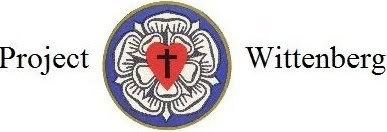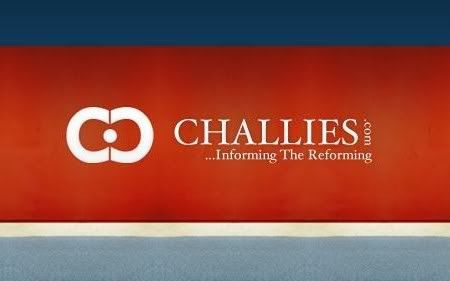 The term “anti-Catholic” is used quite often in Catholic apologetics and in a misleading way. Many Catholic apologists, books, and apologetic websites use the word liberally and without looking back. It instills in their listeners and readers the thought that someone hates their church. In many cases, I believe it is done purposely. After all, who would want to listen to an awful “anti-Catholic”?
The term “anti-Catholic” is used quite often in Catholic apologetics and in a misleading way. Many Catholic apologists, books, and apologetic websites use the word liberally and without looking back. It instills in their listeners and readers the thought that someone hates their church. In many cases, I believe it is done purposely. After all, who would want to listen to an awful “anti-Catholic”?The word is often used in conjunction with words such as “misrepresents” and “ignorant.” For example:
“Anti-Catholics are ignorant and misrepresent what we truly believe.”
Now, the average Catholic will look at rhetoric such as this, formulate a opinion, and react accordingly, usually rejecting what the Protestant has to say even before hearing it. There is no need to hear the "anti-Catholic" because he hates Catholicism and he hates Catholics. The word brings bonding, solidarity, a sense of being, belonging, and commitment.
Admittedly, there are some who may wear their hearts on their sleeves on both sides, Protestant or Catholic, and some may just be spiteful, hateful, ignorant, and misrepresentative people to begin with, but for the majority of Evangelicals involved in apologetics this is simply not true. The majority of us are simply concerned Christians who disagree with Roman Catholic distinctives (the doctrines that define Roman Catholicism) enough to voice our our opinions against these distinctives. We believe that the Gospel is at stake here. One cannot forsake it for the sake of unity, thus we exercise our God-given right to voice our disagreement with doctrines we feel are a part of "another gospel" (see Galatians 1).
The irony in all this is that Catholics are inherently “anti-Protestant” although many don't realize it. Why? Because they are of the position that Protestants are those who left God's true church and this church is the Roman Catholic Church. Now this is a concern because the Catholic desires that Protestantism, however one defines the term, ceases and returns to the ancient Catholic church. Well, Protestants consider themselves "catholic", a part of the universal church, and that's all well and good, but regardless of the antiquity Rome claims, when the Protestant mentions to the Roman Catholic that Rome doesn’t resemble the church of old and that she- because of her distinctives- isn't the church of old, the Catholic regresses and claims that the Protestant is “anti-Catholic” because he tries to take away what from this evident "truth." The Protestant's position is never indulged because he is "ignorant" and "misrepresentative" and those who hear these words walk away from the "anti-Catholic."
Yet still we persist, following what we feel to be Paul's mandate. Trying to bring these issues into the forefront. Yet, when we try to bring them up, the Catholic apologists, books, and websites call us "anti-Catholics"...
... And so it goes...
































6 comments:
Greetings, Churchmouse...
As a Catholic apologist, I seldom, if ever, use the term 'anti-Catholic' or 'ignorant.' I do strive to be charitable, as Christ would have us be charitable and love one another, and use terms like 'misunderstand.' However, I seldom see this same charity returned by non-Catholics, particularly by those who like to quote from CARM, whom I note you support.
"We believe that the Gospel is at stake here."
So do Catholics.
"Protestants consider themselves "catholic""
Catholics also consider non-Catholic Christians, like yourself, to be Catholics, but 'seperated brethren.'
"that she- because of her distinctives- isn't the church of old"
Here we disagree. The Catholic Church is, in fact and scripture, the one true Church founded by Christ and headed by Peter and Peter's successors. (Matt 16:18-19, Isaiah 22:22)
Why you hold your opinion is a mystery to me at this point, but to be charitable, let's assume that you have not yet read much of the writings of the early Christian church. Let's take a portion of the Didache (written about the time of the Gospel of Matthew, widely circulated and used by the early NT church, and recommended for inclusion in the Bible in the earliest church councils.) for example:
"And on the Lord's own day gather yourselves together and break bread and give thanks, first confessing your transgressions, that your sacrifice may be pure. And let no man, having his dispute with his fellow, join your assembly until they have been reconciled, that your sacrifice may not be defiled; for this sacrifice it is that was spoken of by the Lord; {In every place and at every time offer Me a pure sacrifice; for I am a great king, saith the Lord and My name is wonderful among the nations.}"
(The Didache, http://wesley.nnu.edu/biblical_studies/noncanon/fathers/ante-nic/didache.htm)
Now, does this writing from the church of old resemble your everyday non-Catholic worship service or the everyday Catholic Holy Sacrifice of the Mass?
Catholics proclaim the Gospel and offer the 'Lord's Supper' daily in our churches. How about yours?
You should read Justin Martyr's First Apology (http://www.ccel.org/fathers2/ANF-01/anf01-46.htm) and the Catechism of Cyril (http://www.newadvent.org/fathers/310123.htm), Bishop of Jerusalem, before attacking the Catholic Church for not resembling the early church. Other than the Orthodox, no other Christian denomination more closely resembles the early Christian church than the Catholic Church. Catholics have been extremely faithful to the Gospels. We practice the 'hard parts' that non-Catholics ignore or attempt to explain away, like John 6:53-58.
"The Protestant's position is never indulged"
I'm feeling indulgent. What position would you like me to indulge?
"I could not understand why these romancers never took the trouble to find out a few elementary facts about the thing they denounced. The facts might easily have helped the denunciation, where the fictions discredited it. There were any number of real Catholic doctrines I should then have thought disgraceful to the Church . . . But the enemies of the Church never found these real rocks of offence. They never looked for them. They never looked for anything . . . Boundless freedom reigned; it was not treated as if it were a question of fact at all . . . It puzzled me very much, even at that early stage, to imagine why people bringing controversial charges against a powerful and prominent institution should thus neglect to test their own case, and should draw in this random way on their own imagination . . . I never dreamed that the Roman religion was true; but I knew that its accusers, for some reason or other, were curiously inaccurate."
(G.K. Chesterton, The Catholic Church and Conversion, NY: Macmillan, 1926, 36-38)
Pax vobiscum...
- Timothy
Hi Timothy,
Sorry if I gave the impression that uncharitable behavior is confined to the Catholic. Believe me, I know that it comes from both sides. My only point was on how the term is used. I’m not an “anti-Catholic” and those who I associate with aren’t “anti-Catholic” either and you won't find me labeling those who disagree with Protestant essentials "anti-Protestant." The word "anti-Catholic" is just an ends to a mean. By using the term, one is trying to get a biased reaction against the non-Catholic or they are just naive and confrontational. This results in undue prejudice and, sad to say, many Catholic apologists do it purposely. It is on practically every Catholic apologetic website and forum. Again, my only point is the term.
Yes, there are all sorts of attitudes on both sides of the spectrum. I haven’t been on CARM but it has been my experience that Catholics can dish it just as much as the non-Catholics. Although, I re-registered recently, I posted on one thread, but that was short-lived. I posted a link to CARM on my blog because of my familiarity with the ministry and just in case I ever participate again.
"We believe that the Gospel is at stake here."
So do Catholics.
I know.
"Protestants consider themselves "catholic""
Catholics also consider non-Catholic Christians, like yourself, to be Catholics, but 'seperated brethren.'
I know.
"that she- because of her distinctives- isn't the church of old"
Here we disagree. The Catholic Church is, in fact and scripture, the one true Church founded by Christ and headed by Peter and Peter's successors. (Matt 16:18-19, Isaiah 22:22)
Yes, I know your position and have heard all the arguments, so much so, that it is starting to take on a pseudo-mantric form :-) Further, we will continue to disagree on this point because I am not going to change my position and neither are you. Although, the RCC is able to trace her roots to the early church, her distinctives weren’t taught by the early church. You will disagree and claim that distinctives, purgatory for example, weren’t clear but the understanding of it developed. I will say there is nothing to develop and the testament of history points to seeds sown by Origen and Clement of Alexandria which eventually led to a full-blown belief in purgatory.
As for Peter, I can acknowledge a Petrine primacy. Heck! I can even go as far as to acknowledge why some, Protestants included, would consider the Rock (I don’t believe he is, but I don’t fault anyone who does) but this doesn't conclude with a papacy attached with charisms that are neither factual or Scriptural.
Why you hold your opinion is a mystery to me at this point, but to be charitable, let's assume that you have not yet read much of the writings of the early Christian church. Let's take a portion of the Didache (written about the time of the Gospel of Matthew, widely circulated and used by the early NT church, and recommended for inclusion in the Bible in the earliest church councils.) for example:
"And on the Lord's own day gather yourselves together and break bread and give thanks, first confessing your transgressions, that your sacrifice may be pure. And let no man, having his dispute with his fellow, join your assembly until they have been reconciled, that your sacrifice may not be defiled; for this sacrifice it is that was spoken of by the Lord; {In every place and at every time offer Me a pure sacrifice; for I am a great king, saith the Lord and My name is wonderful among the nations.}"
(The Didache, http://wesley.nnu.edu/biblical_studies/noncanon/fathers/ante-nic/didache.htm)
Now, does this writing from the church of old resemble your everyday non-Catholic worship service or the everyday Catholic Holy Sacrifice of the Mass?
Catholics proclaim the Gospel and offer the 'Lord's Supper' daily in our churches. How about yours?
I will assume the words you emphasize are translated to mean the transubstantiated Eucharist. I question what is meant by a “sacrifice” here, but I don’t see your position being any more viable in this passage then mine. What I see is comparable to 1 Corinthians 11 when Paul rebuked the Corinthian church (1 Cor. 11) for the offense amongst the brethren. The sacrament is holy and shouldn’t be taken lightly especially in light of what it reminds us of— His body that was broken for us. If we take of it unworthily we can get sick and die. I can believe this without ascribing to your view. Yet, I don’t see your interpretation within it. As to the liturgical aspect and the love feast. I don't see your Mass, neither do I see my Lord's Supper in that particular passage. It's too vague to make any concrete sense.
You should read Justin Martyr's First Apology (http://www.ccel.org/fathers2/ANF-01/anf01-46.htm) and the Catechism of Cyril (http://www.newadvent.org/fathers/310123.htm), Bishop of Jerusalem, before attacking the Catholic Church for not resembling the early church. Other than the Orthodox, no other Christian denomination more closely resembles the early Christian church than the Catholic Church. Catholics have been extremely faithful to the Gospels. We practice the 'hard parts' that non-Catholics ignore or attempt to explain away, like John 6:53-58.
Ah, “attacking”??? Again, we must watch words like this because it misleads the reader. I am not "attacking" the Catholic Church. I am in “disagreement” with her claims that she is the same church of yore, and I “disagree” due to her distinctives. You stated earlier that you don’t use words such as “ignorant”, but here you are claiming that non-Catholics “ignore” or “explain away” the said verse. I am familiar with Justin and Cyril's writings on this issue, considering I've had other Catholics cite them or point me to them. Again, there is too little said to merit any pause on the matter. I’ll take a raincheck on John 6:53-58 because our arguments are going to be repetitive of other arguments and I want to avoid the quid pro quo.
"The Protestant's position is never indulged"
I'm feeling indulgent. What position would you like me to indulge?
Well, it wasn’t my intent to have debates on my blog and it seems that the tone of your post has changed drastically from "charity" to "ignorant" and "explain away." I am not ignorant, neither do I explain things away. The word "indulgent" inspires me to lean towards purgatory, However limited it may be, yes, let's indulge purgatory. I've always been of the opinion that if Rome considers herself infallible in matters of faith and morals then if the smallest doctrine fails, so does Rome's claims. As you can see from my blog, I don’t post much due to time constraints, so let's practice some brevity and don't expect any quick responses. Yet, this was a big factor leading towards the Reformation and a good place to start.
I don't know if the Chesterton quote was directed towards me or if it was an awfully long signature, but I won't comment. Fact is, the entire book can be found online here: http://www.smart.net/~tak/Chesterton/convertoc.html
Peace,
Ray
Greetings, brother Churchmouse...
Sorry for the poor choice of using "ignore" which does have the same roots as 'ignorant.' I was using 'ignore' meaning that those passages are commonly skipped over, glossed over, i.e., ignored.
Regarding 'attacking', perhaps I could have used 'challenging.' I was unable to determine from your bio where you stood theologically nor where you were on the 'CARM scale.' Protestants are all over the board on what their various denominations and individual churches hold as doctrine. However, I did note that, even though your blog is fairly new with few posts, almost without exception, the posts seem directed against particlar doctrines of the Catholic faith. Even though there are 100,00 unchurched Americans, your post don't seem intended to spread the Gospel ala the Great Commission. Nor do your posts seem directed to persons of a non-Christian faith, such as Muslims, Hindus, or others.
Fair enough regarding let's agree to disagree on the various doctrinal points.
As to the Chesterton quote, yes, that was intended for your benefit. I generally close with another Chesterton quote. As you are seeking to challenge and/or disprove various Catholic doctrines, I thought you might benefit from his advice. I thought it might save you working through the 'Big 10'.
Pax tecum
- Timothy
Hello again Timothy,
You said:
Sorry for the poor choice of using "ignore" which does have the same roots as 'ignorant.' I was using 'ignore' meaning that those passages are commonly skipped over, glossed over, i.e., ignored.
There's no harm done, but I hope that you can see from my writings that nothing is glossed over or skipped. I am a former Roman Catholic, born and baptized, and remained so until I was 28. I am 49 now. I take the utmost care in what I write--that I ponder things thoroughly and that I am fair in presenting it rightfully.
You said:
Regarding 'attacking', perhaps I could have used 'challenging.' I was unable to determine from your bio where you stood theologically nor where you were on the 'CARM scale.' Protestants are all over the board on what their various denominations and individual churches hold as doctrine. However, I did note that, even though your blog is fairly new with few posts, almost without exception, the posts seem directed against particlar doctrines of the Catholic faith. Even though there are 100,00 unchurched Americans, your post don't seem intended to spread the Gospel ala the Great Commission. Nor do your posts seem directed to persons of a non-Christian faith, such as Muslims, Hindus, or others.
Again, no harm done. About the only "challenge" that I am presenting to Catholics is to think things through for themselves. Most Protestants can smell a red herring from a mile away, whether it be by calling them "anti-Catholics" or making issues that our doctrinal difference are all that great. As for my religious tradition, I been a Baptist of the Reformed persuasion since I've left the RCC. As far as my blog and why I direct them at RC doctrines and dogmas, I do so because this is where my strengths lie. They don't lie in Islam, Buddhism, or the such. I want Catholics to think out the things they've been taught and weigh them within the confines of Scripture and the earliest church history, with Scripture taking the upperhand.
You said:
Fair enough regarding let's agree to disagree on the various doctrinal points.
I will always respect someone's disagreement, but it won't stop me from speaking about them :-) Again, I want folks to think for themselves. I am of the opinion that Rome is indeed fallible, even in issues of faith and morals. Rather then getting into long, dragged out debates on infallibility, I prefer to show where the errors lie and thus reveal the fallibility. Hence, this is why I am focusing on purgatory at the moment.
You stated:
As to the Chesterton quote, yes, that was intended for your benefit. I generally close with another Chesterton quote. As you are seeking to challenge and/or disprove various Catholic doctrines, I thought you might benefit from his advice. I thought it might save you working through the 'Big 10'.
Chesterton was entitled to his opinion just as much as the next guy. All too often, Catholic converts and reverts are held in a much higher light and presented to others, no less for their impact. Again, I recognize the fallibility of ALL men, Chesterton, the pope, myself included. Chesterton was critical of those who were critical of Rome and felt that there were inaccuracies being presented. I disagree. There are valid reasons to weigh that which defines her. Chesterton's change of heart isn't any different then those who have crossed the Tiber in either direction.
Peace,
Ray
Mr. Churchmouse-
You're on the way to getting a spot on this webpage:
http://ic.net/~erasmus/RAZ450.HTM#Definitional Controversies
All I have to do is let him know someone dares to write about the term "anti-catholic".
You've written a few paragraphs- these deserve at least a 10 page response and a few joke songs.
Hi Jim,
DA tosses that word around so liberally that it's no wonder his websites are doing well amongst his peers. It seems one can't get through an entire dialogue with a Roman Catholic without ol' Dave being cited somewhere. I guess if one is of the mentality that we are "anti-Catholic" one flocks to those websites which refer to us as such. "Anti-Catholic" is good business :-)
Cracking his "Anti-Catholic" hall of fame doesn't mean much it would seem. Judging from his blog, it seems he'll indulge anyone and considers himself victorious regardless. The incessant verbiage contained in his articles give the impression, at least, that he did refute everyone he's ever engaged. After all, who would really take the time to really read what he has to say?
Peace,
Ray
Post a Comment